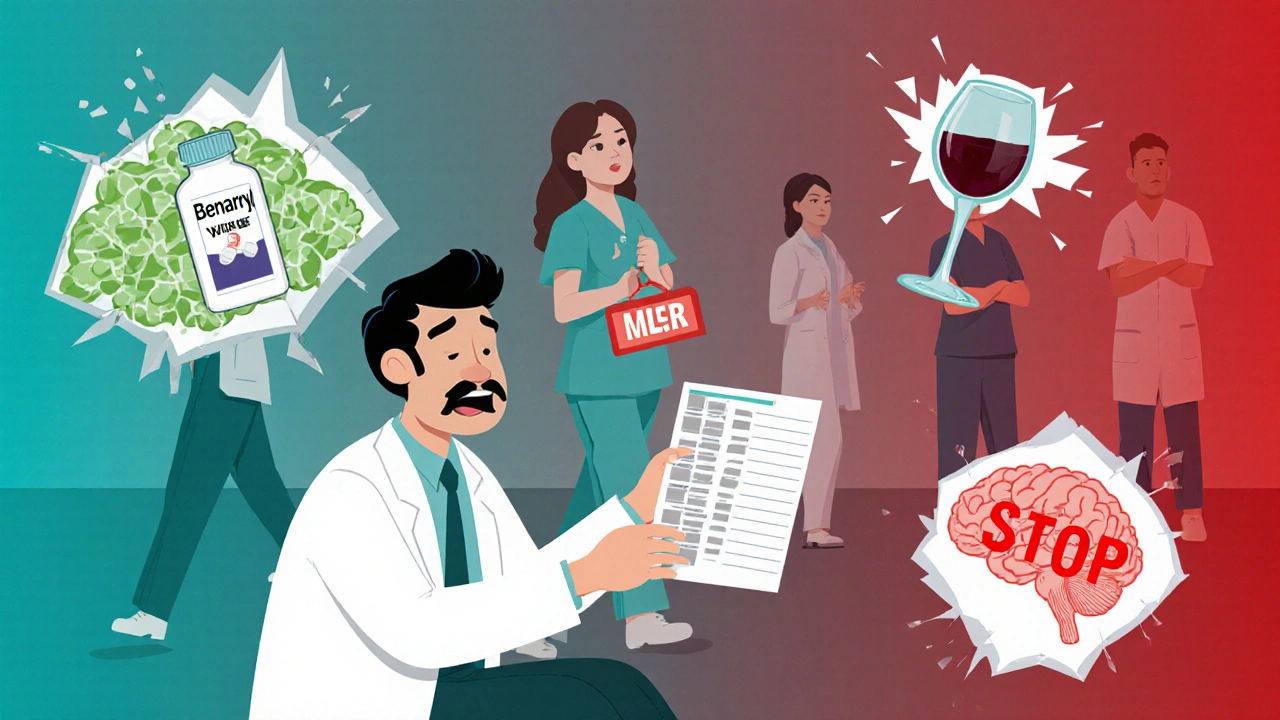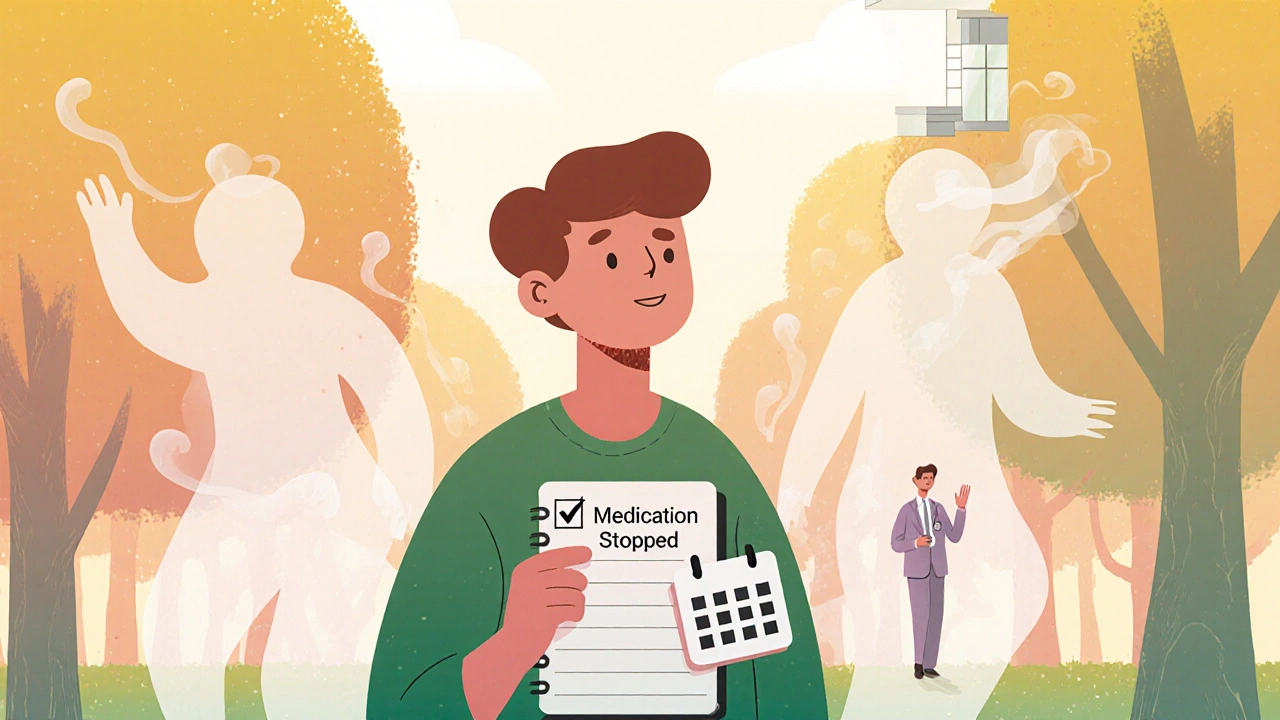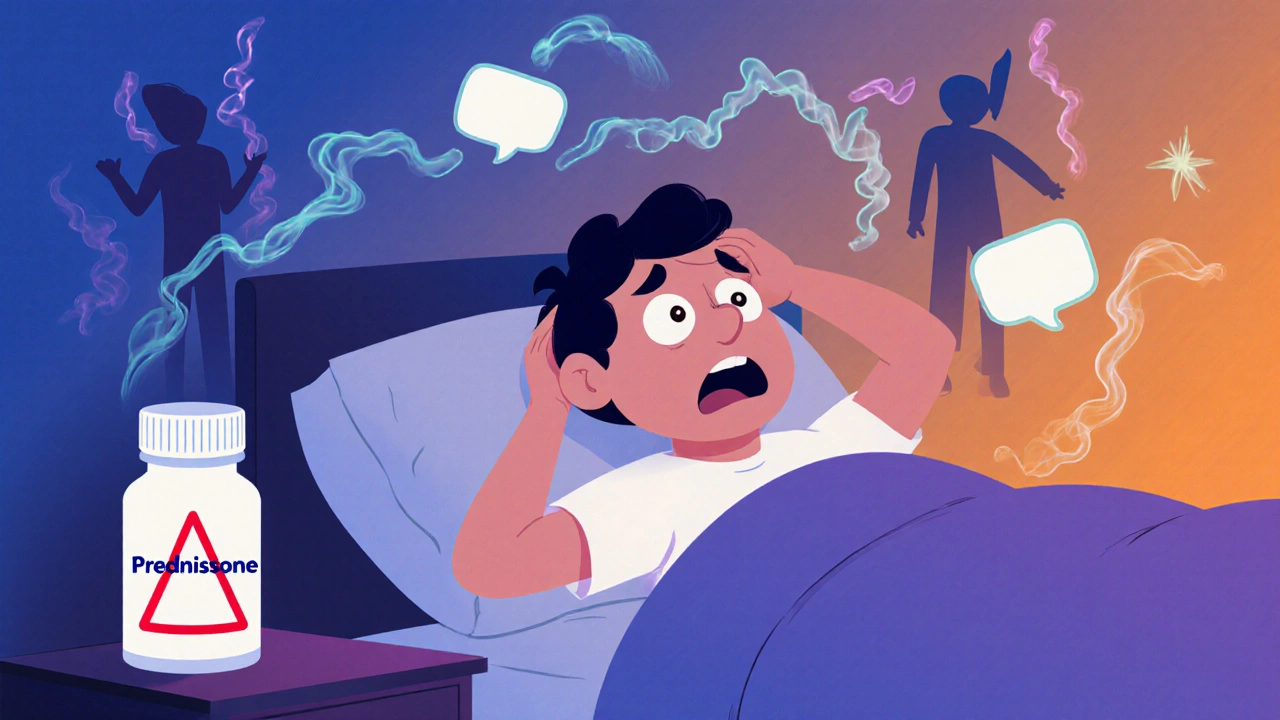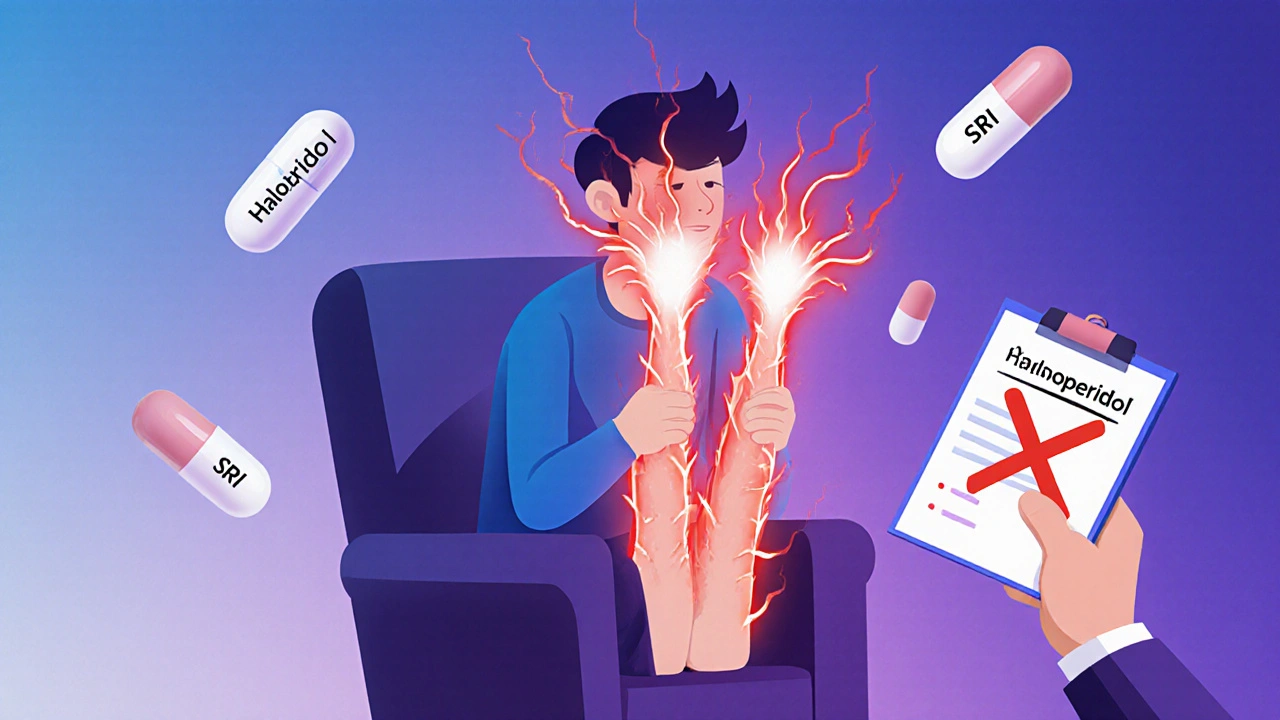Medication-Induced Psychosis Assessment
This tool helps identify if your symptoms might be caused by medication. It's not a diagnosis. Always consult a medical professional for proper evaluation.
It’s not rare for someone to wake up feeling paranoid, hearing voices, or believing things that just aren’t true - and not because of mental illness, but because of a medication they’ve been taking. Medication-induced psychosis can happen with drugs you’d never expect: steroids for back pain, antibiotics for a travel vaccine, even over-the-counter sleep aids. The symptoms are terrifying, but the good news? Most of the time, it’s reversible - if you catch it early.
What Does Medication-Induced Psychosis Actually Look Like?
Medication-induced psychosis isn’t just feeling ‘off.’ It’s a sudden break from reality. The most common signs are:
- Delusions - strong false beliefs, like thinking someone is spying on you, poisoning your food, or controlling your thoughts
- Hallucinations - hearing voices, seeing people who aren’t there, or feeling bugs crawling on your skin
- Disorganized speech - jumping between topics, saying things that don’t connect, or using made-up words
- Severe confusion or memory gaps
- Extreme agitation, aggression, or withdrawal
These symptoms don’t come out of nowhere. Often, they start subtly. A person on high-dose steroids might become unusually anxious or irritable for a few days before full psychosis hits. Someone taking an antimalarial drug for a trip might feel restless, then start seeing shadows move in the corner of their eye. The key is timing: symptoms appear within hours or days after starting a new medication - or during withdrawal.
It’s easy to mistake this for schizophrenia or bipolar disorder. But here’s the difference: in medication-induced psychosis, symptoms usually fade within days or weeks after stopping the drug. If they stick around longer than a month, that’s a red flag for something else.
Which Medications Can Trigger This?
You might be surprised how many common prescriptions carry this risk. It’s not just street drugs or hallucinogens. Even medicines you take daily can cause it:
- Corticosteroids (like prednisone): Up to 5.7% of people on high doses develop psychosis. It’s one of the most common drug triggers.
- Antimalarials (like mefloquine): Used for travel to malaria zones, this drug has caused over 1,200 reported psychosis cases worldwide since the 1980s.
- Antiretrovirals (like efavirenz for HIV): About 2.3% of users report hallucinations or paranoia - enough for the FDA to require warning labels.
- Antidepressants (SSRIs, SNRIs): Rare, but possible - especially when starting or changing doses.
- Anticholinergics (like diphenhydramine in Benadryl or sleep aids): Can cause delirium and hallucinations, especially in older adults.
- Stimulants (like Adderall, methylphenidate): High doses or misuse can trigger paranoia and auditory hallucinations.
- Levodopa (for Parkinson’s): Can cause vivid dreams, hallucinations, or delusions in up to 40% of long-term users.
- Alcohol or benzodiazepine withdrawal: After heavy, long-term use, stopping suddenly can cause severe psychosis that mimics schizophrenia.
Even ibuprofen or opioids in very high doses have been linked to psychotic episodes - though these cases are rare. The risk isn’t about being ‘weak-minded.’ It’s about biology. Some people’s brains react differently to certain chemicals. A history of mental illness, family history of psychosis, or being female increases the chance - but anyone can be affected.
Why It’s So Often Missed
Doctors don’t always connect the dots. A patient walks into the ER screaming that their neighbor is broadcasting thoughts through the walls. The ER team sees psychosis and assumes schizophrenia. They start antipsychotics. But what if the patient started prednisone for asthma two weeks ago? Or took a malaria pill before a trip? Or recently quit drinking?
Studies show only 38% of primary care doctors feel confident spotting medication-induced psychosis. That’s dangerous. Giving an antipsychotic to someone whose psychosis is caused by a steroid can mask the real problem - and delay the only cure: stopping the drug.
The trick is asking the right questions:
- When did the symptoms start?
- What new medications, supplements, or OTC drugs were started in the last 30 days?
- Have you changed doses recently?
- Are you withdrawing from alcohol, sleep meds, or opioids?
- Do you have a personal or family history of mental illness?
If the answer to any of these points to a medication, that’s the first clue.

What Happens in an Emergency?
If someone is in the middle of a psychotic episode - yelling at invisible people, acting violently, or believing they’re in danger - call emergency services immediately. Don’t try to reason with them. Their brain isn’t processing reality. Safety comes first.
In the hospital, the first step is always the same: stop the suspected drug. No exceptions. If it’s a steroid, they’ll taper it. If it’s an antimalarial, they’ll discontinue it. If it’s alcohol withdrawal, they’ll give benzodiazepines to prevent seizures or delirium tremens.
For severe symptoms - extreme agitation, hallucinations that cause self-harm risk - doctors may use a short course of an atypical antipsychotic like olanzapine or quetiapine. But this isn’t a long-term fix. It’s a bridge. The goal is to calm the person down while the body clears the drug.
They’ll also check for other dangers: dehydration, high body temperature, muscle breakdown (rhabdomyolysis) from stimulant overdose, or thiamine deficiency from chronic alcohol use. These can make psychosis worse and need urgent treatment.
Most people improve within 24 to 72 hours after stopping the drug. Steroid-induced psychosis might take 4 to 6 weeks to fully clear. Cocaine-induced psychosis often fades in under 3 days. But if symptoms linger past a month, the doctor will start looking for an underlying condition like schizophrenia.
Recovery and What Comes Next
The outlook is usually positive. Most people return to normal after stopping the medication. But recovery isn’t just about the symptoms disappearing. It’s about understanding what happened - and preventing it again.
After discharge, follow-up is critical. A psychiatrist should review the case within 2 to 4 weeks. They’ll ask: Did the symptoms fully resolve? Was there a prior mental health history? Could this have been the first sign of something else?
Some people never take the triggering drug again. Others might need to avoid similar ones. For example, if mefloquine caused psychosis, they’ll never take it again - and their doctor will choose a different malaria prevention drug. If steroids triggered it, future steroid use will be carefully monitored, with mood checks before and during treatment.
For those with a history of addiction or mental illness, ongoing support matters. Medication-induced psychosis doesn’t cause schizophrenia - but it can reveal an underlying vulnerability. That’s why long-term monitoring is part of the process.

How to Prevent It
You can’t always predict who will react badly - but you can reduce the risk:
- Always tell your doctor about every medication, supplement, and herbal product you take - including what you buy over the counter.
- If you’re starting a new drug with known psychiatric risks (steroids, antimalarials, efavirenz), ask: ‘Could this cause hallucinations or paranoia?’
- Keep a symptom journal. Note mood changes, sleep issues, or strange thoughts in the first week after starting a new medicine.
- If you’re on long-term steroids or Parkinson’s meds, schedule regular mental health check-ins with your doctor.
- Never stop alcohol, benzodiazepines, or opioids suddenly without medical help. Withdrawal can be deadly.
The FDA requires warning labels on drugs like efavirenz and mefloquine for a reason. Read them. If the label says ‘contact your doctor if you feel depressed, anxious, or hear voices’ - don’t ignore it. Call the same day.
Final Thought: It’s Not Your Fault
If you or someone you love has experienced medication-induced psychosis, it’s not weakness. It’s a biological reaction. Thousands of people have been through this - often without knowing why. The system isn’t perfect. But awareness is growing. More doctors are learning to ask the right questions. More patients are speaking up. And with the right action, most cases resolve completely - with no lasting damage.
The key is acting fast. If you suspect a medication is causing psychosis, don’t wait. Don’t assume it’s ‘just stress.’ Call your doctor. Go to the ER. Your brain is trying to tell you something - and it’s worth listening to.
Can over-the-counter meds cause psychosis?
Yes. First-generation antihistamines like diphenhydramine (Benadryl, Tylenol PM) can cause hallucinations and confusion, especially in older adults or when taken in high doses. Sleep aids, cold medicines, and even some allergy pills contain these ingredients. Don’t assume ‘natural’ or ‘over-the-counter’ means safe - especially when mixing multiple products.
How long does medication-induced psychosis last?
It varies. Cocaine-induced psychosis may resolve in 24 to 72 hours. Steroid-induced psychosis usually clears in 4 to 6 weeks. Alcohol withdrawal psychosis can last days to weeks, depending on severity. If symptoms last longer than a month after stopping the drug, it’s no longer considered medication-induced - and further evaluation for conditions like schizophrenia is needed.
Is medication-induced psychosis the same as schizophrenia?
No. Schizophrenia is a chronic brain disorder with symptoms that persist for at least six months and aren’t caused by drugs or medical conditions. Medication-induced psychosis is temporary and directly linked to a substance. The key difference is timing: if symptoms disappear after stopping the drug, it’s not schizophrenia. But sometimes, the drug reveals an underlying vulnerability - so follow-up is essential.
Can you get psychosis from stopping a medication?
Yes. Withdrawal from alcohol, benzodiazepines, barbiturates, and even some antidepressants can trigger psychosis. This is especially true after long-term, high-dose use. Stopping suddenly can cause the brain to overreact, leading to hallucinations or delusions. Never stop these medications without medical supervision.
What should I do if I think my medication is causing psychosis?
Stop taking the medication only if instructed by a doctor. Call your prescribing provider immediately. If symptoms are severe - you’re in danger, or someone else is - go to the emergency room. Bring a list of all medications, including supplements and OTC drugs. Don’t wait to see if it gets better. Early action saves lives.








Victoria Stanley
November 25, 2025 AT 15:33Just had a patient last month who developed full-blown hallucinations after taking Benadryl for allergies. She swore her cat was talking to her in Mandarin. Turned out it was the diphenhydramine - she’d been doubling the dose because ‘it made her sleep better.’ Stopped the med, 48 hours later she was back to normal. This isn’t rare. OTC doesn’t mean harmless.
Vineeta Puri
November 25, 2025 AT 23:59As a clinical pharmacist with over 20 years in geriatrics, I cannot stress enough how often anticholinergics are overlooked as a cause of delirium and psychosis in elderly patients. Diphenhydramine, oxybutynin, even some tricyclic antidepressants - all are silent perpetrators. A simple med review often reveals the trigger. Always check the anticholinergic burden score. It’s not speculation - it’s evidence-based practice.
Jeff Hicken
November 26, 2025 AT 20:38lol so now even ibuprofen can make you crazy? next they’ll say aspirin gives you voices. my uncle took prednisone for his back and thought his dog was the president. he tried to vote for him. i mean… i get it, but come on. this is just fearmongering with a medical label.
Natashia Luu
November 27, 2025 AT 20:31It is deeply concerning that the medical community continues to underdiagnose and misattribute medication-induced psychosis as primary psychiatric illness. The consequences are catastrophic: inappropriate antipsychotic prescriptions, prolonged suffering, and unnecessary institutionalization. This is not anecdotal. It is systemic. And until clinicians are trained to ask ‘What did you start taking?’ before ‘Do you have a family history?’ patients will continue to be harmed.
Yvonne Franklin
November 28, 2025 AT 20:02Been there. Took mefloquine for a trip to Thailand. Started seeing figures in mirrors. Thought I was being followed. Stopped the pill. Three days later - gone. No therapy. No meds. Just stop the drug. Why isn’t this common knowledge?
Neoma Geoghegan
November 28, 2025 AT 21:13Withdrawal psychosis is the elephant in the room. People quit benzos cold turkey after years of use. Then they panic because they’re hearing voices. Docs throw them antipsychotics. Never ask about tapering. Never check history. This is iatrogenic trauma wrapped in a Rx bottle.
steven patiño palacio
November 29, 2025 AT 10:43My sister developed paranoid delusions after starting an SSRI for anxiety. She believed her coworkers were planting microphones in her coffee mug. She stopped the med on her own. Symptoms resolved in 10 days. Her psychiatrist didn’t even consider the drug as a cause until we brought up the timeline. This needs to be standard protocol - not an afterthought.
Adam Hainsfurther
November 30, 2025 AT 06:03I work in ER. We see this every month. Someone comes in screaming about aliens controlling their thoughts. We check meds - turns out they’ve been mixing NyQuil, Adderall, and some ‘energy booster’ from the gas station. No one tells the doctor about OTC stuff. No one thinks it matters. It matters. A lot.
Nikki C
November 30, 2025 AT 10:09My grandma took Benadryl for sleep. One night she called 911 because she said her TV was whispering her name. They took her to psych. They gave her antipsychotics. She was confused for weeks. Turns out - it was just the antihistamine. She stopped it. She was fine. Why do we treat seniors like broken machines instead of people with sensitive neurochemistry?
Alex Dubrovin
November 30, 2025 AT 16:24Had a friend on efavirenz for HIV. Started hearing his dead dad talking to him. He didn’t tell his doctor because he thought it was ‘just stress.’ Took 3 months before he got the courage to say something. By then he was in therapy for ‘schizophrenia.’ They switched his med. Symptoms vanished in two weeks. He’s fine now. But the stigma? That stuck.
Douglas cardoza
December 1, 2025 AT 11:31My cousin took prednisone for asthma and thought he was Jesus. He started preaching in the grocery store. We took him to the hospital. They stopped the steroid. He woke up two days later asking why everyone was staring at him. No brain damage. No lifelong meds. Just a bad reaction. Why isn’t this taught in med school?
Rachael Gallagher
December 3, 2025 AT 06:45These ‘medication psychosis’ stories are just woke nonsense. People are weak. They can’t handle stress so they blame drugs. My grandpa took steroids for 10 years and never heard voices. If you’re hearing things, maybe you’ve got mental illness. Not every weird thought is a drug side effect.
Jacob McConaghy
December 4, 2025 AT 17:36Look, I get why this post matters. I’ve seen people get misdiagnosed because doctors don’t ask the right questions. But we also need to stop stigmatizing antipsychotics. Sometimes you need them as a bridge - even if the root cause is a drug. It’s not either/or. It’s both. You stop the bad med AND you stabilize the person. Neither is the enemy.
Andy Louis-Charles
December 6, 2025 AT 04:56Just want to add - if you’re on long-term steroids or Parkinson’s meds, ask for a baseline mental health check before starting. It’s not paranoia. It’s prevention. 🙏
akhilesh jha
December 7, 2025 AT 05:41In India, we rarely consider drug-induced psychosis because we assume all mental illness is genetic or spiritual. But I’ve seen it - a young man on mefloquine thought his shadow was a demon. He was treated with exorcism. He died of dehydration. This isn’t just a Western problem. It’s a global blind spot.